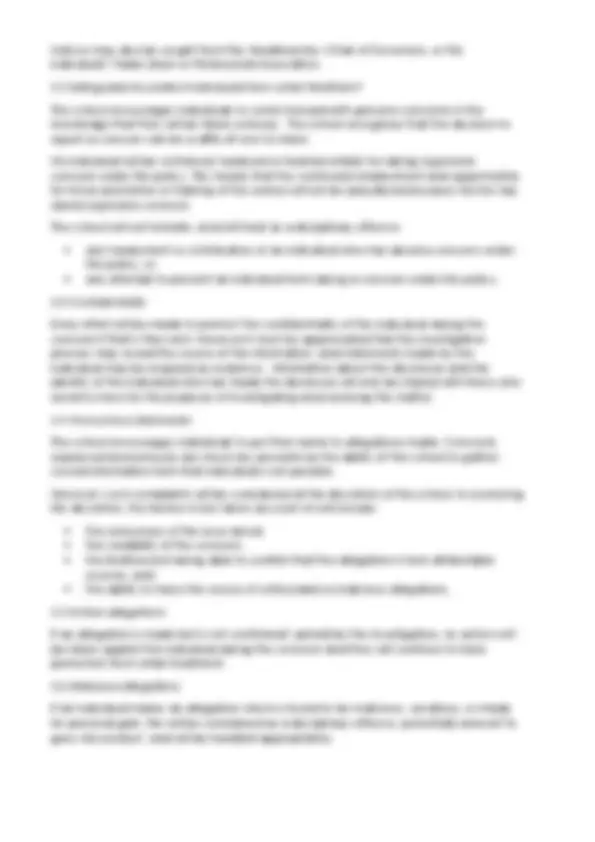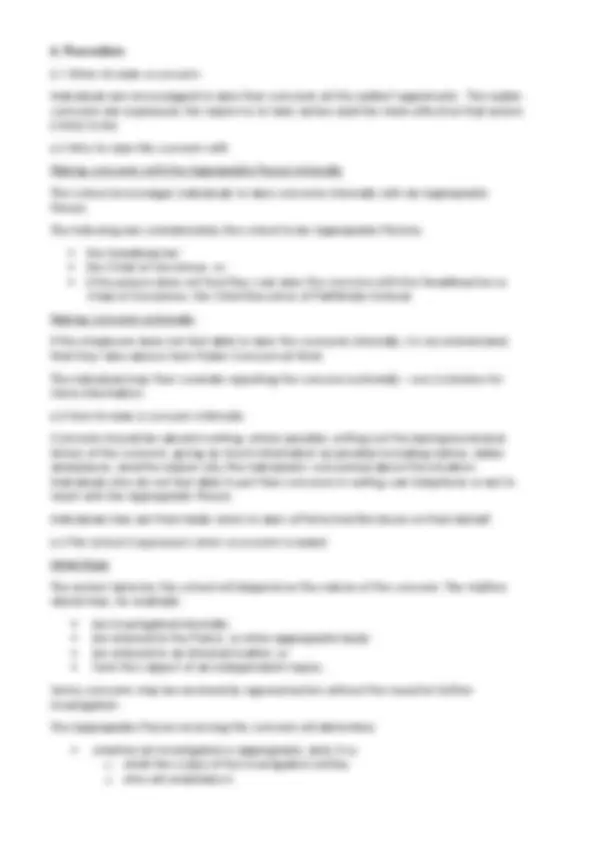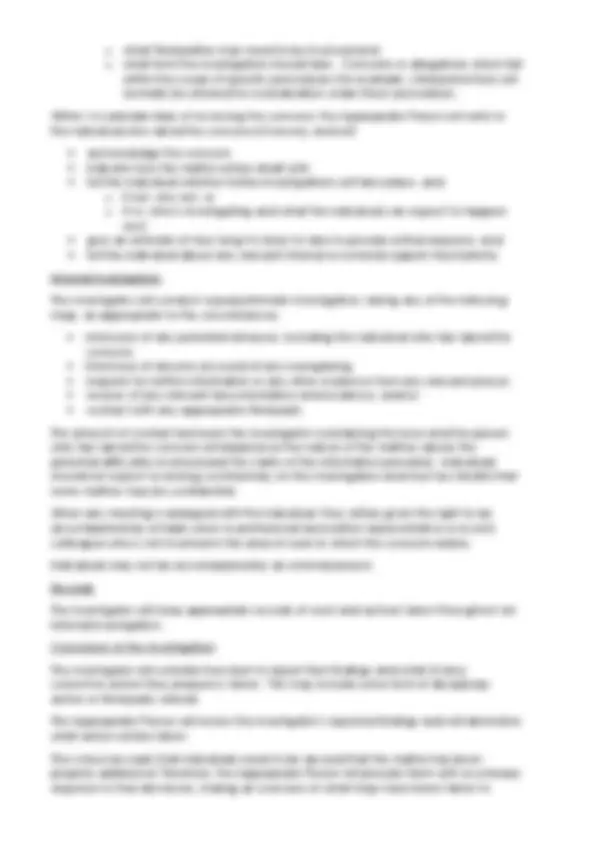





Study with the several resources on Docsity

Earn points by helping other students or get them with a premium plan


Prepare for your exams
Study with the several resources on Docsity

Earn points to download
Earn points by helping other students or get them with a premium plan
Community
Ask the community for help and clear up your study doubts
Discover the best universities in your country according to Docsity users
Free resources
Download our free guides on studying techniques, anxiety management strategies, and thesis advice from Docsity tutors
The school wants all workers to be confident that their concerns will be taken seriously and that they will be protected from unfair treatment if they raise ...
Typology: Schemes and Mind Maps
1 / 6

This page cannot be seen from the preview
Don't miss anything!




AntiBullying & Harassment Policy Complaints Procedure
The school wants all workers to be confident that their concerns will be taken seriously and that they will be protected from unfair treatment if they raise a concern. The school is committed to the highest standards of openness, probity and accountability. It encourages an open dialogue between staff, management and governors to ensure concerns are resolved at the earliest opportunity. It is important to the school that any wrongdoing within the school is reported and properly dealt with. The school recognises that workers are valuable eyes and ears within the school, and therefore encourages all individuals with concerns to come forward and voice these. If an individual has concerns about anything happening within the school they should read this policy. This policy sets out the way in which individuals may raise concerns and how they will be dealt with. The Public Interest Disclosure Act 1998 protects workers who make 'protected disclosures' from dismissal or from being subject to a detriment.
This policy applies to all employees, workers, agency staff and contractors working for the school who wish to raise a concern. However, the following types of concern should be raised under different policies. Employees with concerns about their own employment should refer to the school’s Grievance Policy.
Concerns that an employee has been bullied or harassed should be raised under the school’s AntiBullying and Harassment policy. Any external person seeking to raise a concern should refer to the school’s Complaints Procedure.
The term ‘individual’ used throughout this document means any school employee, worker, agency staff or contractor who is considering raising, or has raised, a concern. The term ‘Appropriate Person’ used throughout this document means a person internal to the employer to whom concerns may be raised and through whom appropriate investigations and action will be taken. Those persons are described in 6.2. A Protected Disclosure is one made in the public interest where the individual has a reasonable belief that: a criminal offence; a breach of legal obligation; a miscarriage of justice; an act creating risk to health and safety; an act causing damage to the environment; or concealment of any of the above; is being, has been, or is likely to be, committed.
The Chair of Governors has overall responsibility for: the maintenance and operation of this policy maintaining a record of concerns raised and the outcomes, and reporting as necessary to the Governing Body, and/or the Employer. All school employees, workers, agency staff, contractors and governors have a responsibility to: properly adhere to this policy, and raise any concerns they have in accordance with this policy.
5 .1 Advice on using this policy If an individual is unsure whether or not to use this policy, or wants independent advice at any stage, they can contact Public Concern at Work which is an independent charity. They can give free, confidential and practical advice at any stage on whether and how to raise a concern about danger or wrongdoing at work. Public Concern at Work: Telephone (general enquiries): 020 3117 2520 Whistleblowing Advice line: 020 7404 6609 Email: UK advice line: whistle@pcaw.org.uk UK services: services@pcaw.org.uk
6.1 When to raise a concern Individuals are encouraged to raise their concerns at the earliest opportunity. The earlier concerns are expressed, the easier it is to take action and the more effective that action is likely to be. 6.2 Who to raise the concern with Raising concerns with the Appropriate Person internally The school encourages individuals to raise concerns internally with an Appropriate Person. The following are considered by the school to be Appropriate Persons: the Headteacher the Chair of Governors, or if the person does not feel they can raise the concern with the Headteacher or Chair of Governors, the Chief Executive of Pathfinder Schools Raising concerns externally If the employee does not feel able to raise the concerns internally, it is recommended that they take advice from Public Concern at Work. The individual may then consider reporting the concern externally – see 6.6 below for more information. 6.3 How to raise a concern internally Concerns should be raised in writing, where possible, setting out the background and history of the concern, giving as much information as possible including names, dates and places, and the reason why the individual is concerned about the situation. Individuals who do not feel able to put their concerns in writing can telephone or ask to meet with the Appropriate Person. Individuals may ask their trade union to raise a Protected Disclosure on their behalf. 6.4 The school’s approach when a concern is raised Initial Steps The action taken by the school will depend on the nature of the concern. The matters raised may, for example: be investigated internally, be referred to the Police, or other appropriate body be referred to an External Auditor, or form the subject of an independent inquiry. Some concerns may be resolved by agreed action without the need for further investigation. The Appropriate Person receiving the concern will determine: whether an investigation is appropriate, and, if so, o what the scope of the investigation will be, o who will undertake it,
o what third parties may need to be involved and o what form the investigation should take. Concerns or allegations which fall within the scope of specific procedures (for example, child protection) will normally be referred for consideration under those procedures. Within 14 calendar days of receiving the concern, the Appropriate Person will write to the individual who raised the concern (if known), and will: acknowledge the concern indicate how the matter will be dealt with, tell the individual whether further investigations will take place, and o if not, why not, or o if so, who is investigating and what the individual can expect to happen next, give an estimate of how long it is likely to take to provide a final response, and tell the individual about any relevant internal or external support mechanisms. Internal Investigation The investigator will conduct a proportionate investigation, taking any of the following steps, as appropriate to the circumstances: interviews of any potential witnesses, including the individual who has raised the concern, interviews of anyone accused of any wrongdoing, requests for written information or any other evidence from any relevant person, reviews of any relevant documentation and evidence, and/or contact with any appropriate third party. The amount of contact between the investigator considering the issue and the person who has raised the concern will depend on the nature of the matters raised, the potential difficulties involved and the clarity of the information provided. Individuals should not expect a running commentary on the investigation and must be mindful that some matters may be confidential. When any meeting is arranged with the individual, they will be given the right to be accompanied by a trade union or professional association representative or a work colleague who is not involved in the area of work to which the concern relates. Individuals may not be accompanied by an external person. Records The investigator will keep appropriate records of work and actions taken throughout an internal investigation. Conclusion of the Investigation The investigator will consider how best to report their findings and what (if any) corrective action they propose is taken. This may include some form of disciplinary action or third party referral. The Appropriate Person will review the investigator’s reported findings and will determine what action will be taken. The school accepts that individuals need to be assured that the matter has been properly addressed. Therefore, the Appropriate Person will provide them with a summary response to their disclosure, sharing an overview of what steps have been taken to